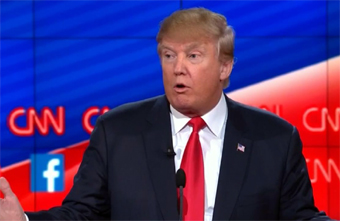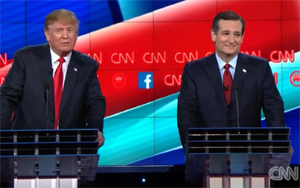
Images courtesy of CNN
Trump Reaffirms Loyalty Pledge to GOP
| published December 17, 2015 |
By R. Alan Clanton, Thursday Review editor
During Tuesday night’s CNN Republican Debate in Las Vegas, candidate Donald Trump reiterated a point crucial to many within the Republican Party. When asked by Salem Radio Network commentator and host Hugh Hewitt whether Trump was planning to stick with the Republican Party even if the outcome of the nomination does not please him—meaning he is not the GOP’s nominee in 2016—or, would he bolt from the party and form an independent candidacy.
Trump gave an answer which was no doubt comforting for Republican leaders and establishment figures: he has no plans to form a third party or run as an independent. Hewitt, as he was prone to do during the debate, wanted an even more unequivocal answer. So you will abide by the terms of the pledge you signed months ago? Yes, Trump said, he will stick with that pledge, and, it seems, the GOP.
“I’ve gained deep respect for the Republican leadership,” Trump explained, “I’ve gained respect for many—I’m going to even say all, in different forms—for the people on this dais [laughter from the audience], and I’ve got great respect for the people I have met through this process.”
Some mighty magnanimous words from the king of the one-liner insult. And an important assurance from the unpredictable Trump that he will not eventually split the party in November 2016.
Some political observers suggest that this was Trump’s way of diffusing the reignited issue of a brokered Republican convention, talk of which made the rounds last week after a Washington Post report saying that a cadre of Republican heavyweights, GOP fundraisers, and high-dollar rainmakers had convened an ad hoc Come-to-Jesus meeting with top RNC officials. The reason was clear: at least a dozen Republican candidates remain active and determined—some with robust fundraising, others with modest caches of money, still others openly planning to trudge through the early caucus and primary states with or without cash-flow.
This has raised the specter of a fragmented GOP primary process, in which Trump remains the de facto front-runner, but is unable to make a clean win of it in a field still crowded with candidates. And with so many anti-Trumps active in the race—there are still some 15 candidates in the GOP running for President—it may become mathematically unlikely that any one candidate will safely secure the required number of delegates prior to the convention’s opening gavel. Indeed, unless Trump scores outright victories in several of the earliest states (and for now Iowa is Cruz Country), the odds of a long, arduous, bitter season of primaries and caucuses goes up dramatically.
Trump remains the front-runner in most national polls, but has shown signs of leakage in several early states, including New Hampshire where New Jersey Governor Chris Christie has made inroads, and in South Carolina, where both Rubio and Cruz have begun to see increases in support. If Trump wins in Florida, it may be because the battle for second place between home state favorites Senator Marco Rubio and former Governor Jeb Bush will deeply split the Sunshine State.
But for many within the so-called “establishment” of the GOP, Trump’s very existence remains problematic, even troubling. Some heavyweights worry openly that Trump may pave a wide road for a Clinton victory in 2016. Others fret about each new outrage channeled into the media conversation: insults lobbed at various groups which could in effect kill any hope of Republican outreach and drive some independent and non-aligned voters away, perhaps permanently.
Trump’s widely advertised and frequently predicted demise has yet to materialize in a nomination fight which still has the power to shock and surprise. Pundits, analysts, writers and journalists from New York to Los Angeles, from Seattle to Miami, have been attempting to pick the moment of Trump’s great deflation, and his inevitable fall from the sky. Yet he remains stubbornly in first place in national polls—this despite a series of would-be front runners ranging from Carly Fiorina’s August surge to Ben Carson’s swell of support in October and November. Cruz is not the first to puncture Trump’s lead in Iowa, as both Carson and Rubio have at one time or the other been in that same spot.
Bush meanwhile has dipped into single digits in the Hawkeye State, a dangerous place to be for the once-presumptive front-runner and the early cash-flow leader. With Bush stuck in fifth or sixth place in Iowa despite a statewide TV and radio advertising barrage, “establishment” Republicans (a term which we can loosely define as traditionalists and those disinterested in party insurrection) are concerned that their investment will come to naught. Worse, the party could face catastrophe in November if Trump goes off the rails with additional insults to the very groups which party strategists agreed in 2013 to make amends with—Latinos, African-Americans, religious minorities, women, younger voters.
Such fears triggered talk of attempts to derail Trump in the run-up to Iowa. Thus the Washington Post’s reporting on the content of that meeting between RNC officials, party fundraisers and heavyweights, and some representatives of varying candidates. Trump’s outrage at the talk of a brokered convention was genuine, and it spurred him to remind the RNC that he can still bolt the party and take his sea of supporters with him. It also prompted anger from Ben Carson, who said that any attempt to nullify the will of the voters would trigger his own disaffection from the GOP, along with a possible independent run.
But RNC officials were quick to point out that the Post had reported it wrongly: the meeting was simply to consider the possibility that no one candidate arrives at next summer’s convention with enough delegates to secure the nomination on the first round of balloting—in which case, the convention opens up into negotiations and politicking and old-fashioned brawling within the rules-of-order. The RNC explained that there was never an attempt to rob Trump…or Carson…or anyone, for that matter…of a rightfully secured nomination for President. It’s just that it was time to dust off those protocols for a contested convention in which the outcome is not preordained.
To younger voters this may seem like strange and unfamiliar territory, as it should. Americans haven’t had a “brokered” convention since 1968, when the Democrats met for a nationally-televised bloodbath in Chicago and exposed their deep rifts for all to see. The last time the Republican Party had any convention drama was in 1976, when President Gerald Ford battled with challenger Ronald Reagan right through the double-doors of the convention center in Kansas City. Reagan and Ford fought for the loyalty of every last delegate using foot soldiers who fought with every last breath, and some old timer Republicans still wince at the pain from the arm-twisting and knife punctures that commenced. Ford eventually prevailed, and it was the last time either party saw hand-to-hand combat inside a convention.
Since then, the political conventions of the two major parties have been heavily scripted, carefully choreographed events—coronations, in essence. Neither party much likes surprises at conventions, whether it was the balloon-release failure at John Kerry’s moment of glory in 2004 (a dark harbinger, we learned later, for when balloon’s fail to fall on cue the party loses in November), to Clint Eastwood’s off-message bit of improv in Tampa in 2012. No surprises, or someone with a big vaudeville stage hook will yank you from the podium.
But as the RNC and the Republican establishment has learned, Trump loves surprises. His pranksterism knows no limits. And he remains aloft despite six months or more of prognostication that he will soon descend, especially as GOP voters come around to the realities of a general election.
Tuesday’s debate in Las Vegas showed us Trump—again-at his best, or worst. He avoided getting into the weeds of policy discussion, he lobbed insults at others in the room, he made funny faces when he was in turn being insulted, and he dug in his heels on a dozen of his most controversial statements—from the border wall to the deportation of millions, from the “internet thing” to a moratorium on Muslims entering the U.S. Gamely, bravely, even—some have argued—effectively, Bush hammered Trump for being a grandstander and a showman, and reminded those watching that Trump is not a “serious” candidate, nor is the billionaire real estate mogul capable of “serious policy discussion.”
Bush’s broadsides pounded the USS Trump squarely along its hull. But Trump merely shrugs it off, and the ship remains afloat. Ironically, even though most analysts scored Bush solid points for his attempts to take Trump down a notch, most agree that it is unlikely to have a net negative effect on Trump or his poll numbers, nor will it give Bush the badly needed uptick he needs to regain lost ground in Iowa, New Hampshire, or beyond.
Texas Senator Ted Cruz, by contrast, is making gains without much in the way of direct attacks on Trump. A brief skirmish last week and over the weekend between the two front runners—Trump had called Cruz a “maniac” in the Senate, and Cruz had in effect impugned Trump’s competence to be in command of the nation’s nuclear missiles—quickly ramped down by the start of the debate in Las Vegas. When moderators attempted to chum the waters with blood and red meat in an unvarnished attempt to goad Trump and Cruz into a fight, both men waved it aside. Détente returned with an almost comical anti-climax.

“He’s just fine,” Trump said of Cruz, patting him on the back, “don’t worry about it.” It was the greatest, most heavily-promoted fight never to have occurred. Instead, Cruz and Rubio clashed in an epic back-and-forth on immigration policy and border control, arguably one of the most heated and intense exchanges of all the debates this year. That dog fight was a mere prelude for what can be expected in the upcoming weeks, as New Year’s approaches and the days between now and the Iowa caucuses tick down. The real battle is no longer about toppling Trump, but instead, occupying as much high ground for the number two and number three spots in Iowa and New Hampshire.
In the meantime, Trump has doubled down on his reassurances to the RNC, to reporters and to other candidates that he has no intention of bolting the GOP for an independent run—acknowledging tacitly that to break away from the Republican Party would mean a cakewalk for Hillary Clinton.
“I am totally committed to the Republican Party,” Trump said on Tuesday, “I feel honored to be the front-runner. I will do everything in my power to beat Hillary Clinton.”
Related Thursday Review articles:
Republicans: Policy & Fireworks in Las Vegas; R. Alan Clanton; Thursday Review; December 16, 2015.
Cruz Surges to First Place in Iowa; Thursday Review staff; Thursday Review; December 15, 2015.
